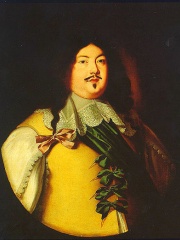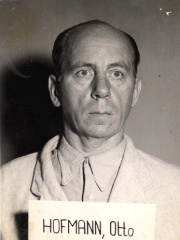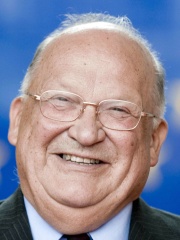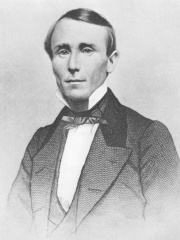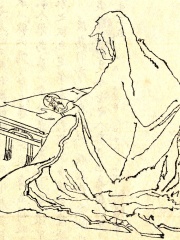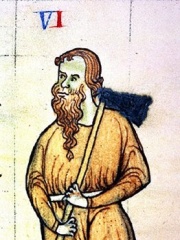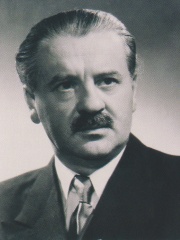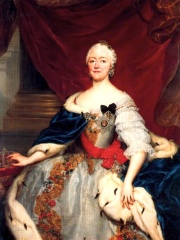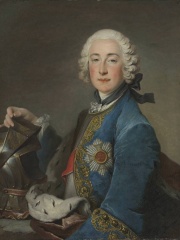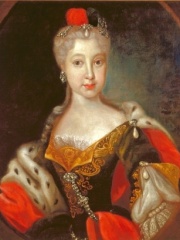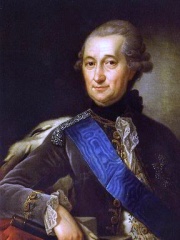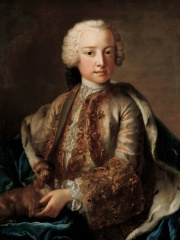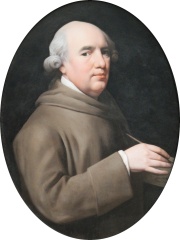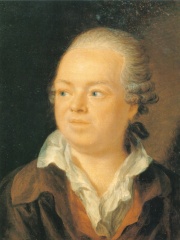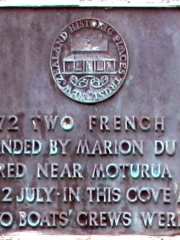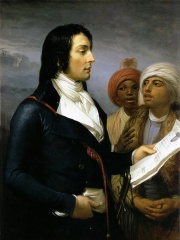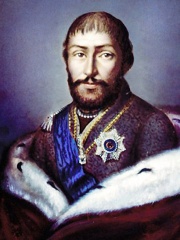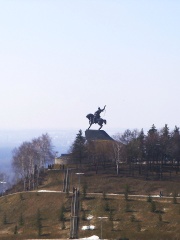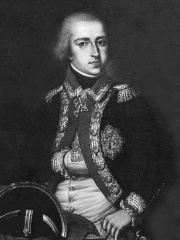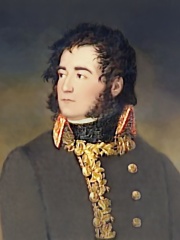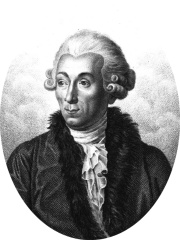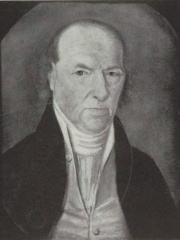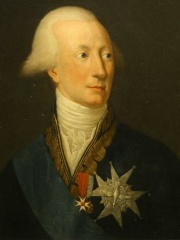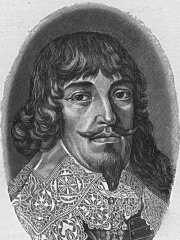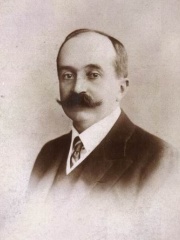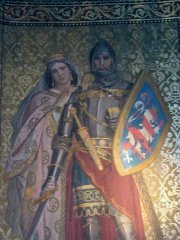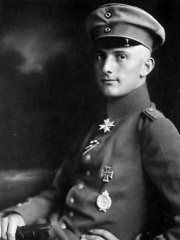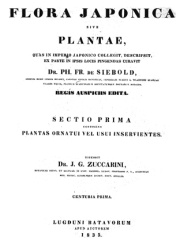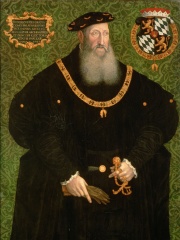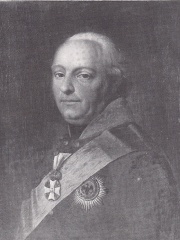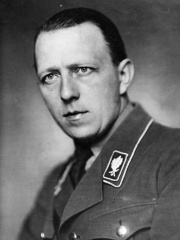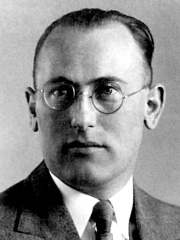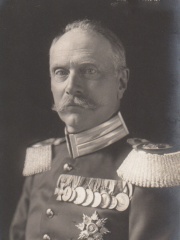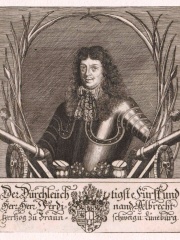POLITICIAN
Ernest Frederick, Duke of Saxe-Coburg-Saalfeld
1724 - 1800
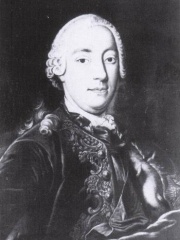
 Ernest Frederick, Duke of Saxe-Coburg-Saalfeld
Ernest Frederick, Duke of Saxe-Coburg-Saalfeld
Ernest Frederick, Duke of Saxe-Coburg-Saalfeld (German: Ernst Friedrich, Herzog von Sachsen-Coburg-Saalfeld; 8 March 1724 – 8 September 1800), was a Duke of Saxe-Coburg-Saalfeld. Read more on Wikipedia
His biography is available in 22 different languages on Wikipedia (up from 20 in 2024). Ernest Frederick, Duke of Saxe-Coburg-Saalfeld is the 6,087th most popular politician (down from 5,542nd in 2024), the 1,618th most popular biography from Germany (down from 1,519th in 2019) and the 470th most popular German Politician.
Ernest Frederick, Duke of Saxe-Coburg-Saalfeld, was a German prince and general who served as a field marshal in the Austrian army. He is most famous for his role in the Battle of Leipzig in 1813.
Memorability Metrics
Page views of Ernest Frederick, Duke of Saxe-Coburg-Saalfeld by language
Among POLITICIANS
Among politicians, Ernest Frederick, Duke of Saxe-Coburg-Saalfeld ranks 6,087 out of 19,576. Before him are Odoardo Farnese, Duke of Parma, Otto Hofmann, Jean-Luc Dehaene, William Walker, Kit Bond, and Zhao Mengfu. After him are Hōjō Masako, Hamida Djandoubi, Beatrice of Castile, Diarmait Mac Murchada, Zoltán Tildy, and Emperor Chong of Han.
Most Popular Politicians in Wikipedia
Go to all RankingsOdoardo Farnese, Duke of Parma
1612 - 1646
HPI: 65.21
Rank: 6,083
Otto Hofmann
1896 - 1982
HPI: 65.21
Rank: 6,084
Jean-Luc Dehaene
1940 - 2014
HPI: 65.20
Rank: 6,085
William Walker
1824 - 1860
HPI: 65.20
Rank: 6,086
Kit Bond
1939 - 2025
HPI: 65.20
Rank: 6,087
Zhao Mengfu
1254 - 1322
HPI: 65.20
Rank: 6,088
Ernest Frederick, Duke of Saxe-Coburg-Saalfeld
1724 - 1800
HPI: 65.20
Rank: 6,089
Hōjō Masako
1156 - 1225
HPI: 65.20
Rank: 6,090
Hamida Djandoubi
1949 - 1977
HPI: 65.19
Rank: 6,091
Beatrice of Castile
1293 - 1359
HPI: 65.19
Rank: 6,092
Diarmait Mac Murchada
1110 - 1171
HPI: 65.19
Rank: 6,093
Zoltán Tildy
1889 - 1961
HPI: 65.19
Rank: 6,094
Emperor Chong of Han
143 - 145
HPI: 65.19
Rank: 6,095
Contemporaries
Among people born in 1724, Ernest Frederick, Duke of Saxe-Coburg-Saalfeld ranks 13. Before him are Louise of Great Britain, Duchess Maria Antonia of Bavaria, Frederick Michael, Count Palatine of Zweibrücken, Countess Palatine Maria Franziska of Sulzbach, Peter von Biron, and Princess Sophie Antoinette of Brunswick-Wolfenbüttel. After him are Franz Aepinus, Eva Ekeblad, Johann Nepomuk Karl, Prince of Liechtenstein, George Stubbs, Franz Anton Maulbertsch, and Marc-Joseph Marion du Fresne. Among people deceased in 1800, Ernest Frederick, Duke of Saxe-Coburg-Saalfeld ranks 11. Before him are Louis Desaix, Adélaïde of France, Peter von Biron, George XII of Georgia, Salawat Yulayev, and Salomon Maimon. After him are Lorenzo Mascheroni, Charles Emmanuel, Prince of Carignano, Jean-Antoine Marbot, Johann Hermann, John Blair Jr., and François Claude Amour, marquis de Bouillé.
Others Born in 1724
Go to all RankingsLouise of Great Britain
COMPANION
1724 - 1751
HPI: 68.29
Rank: 7
Duchess Maria Antonia of Bavaria
COMPOSER
1724 - 1780
HPI: 68.28
Rank: 8
Frederick Michael, Count Palatine of Zweibrücken
POLITICIAN
1724 - 1767
HPI: 66.83
Rank: 9
Countess Palatine Maria Franziska of Sulzbach
POLITICIAN
1724 - 1794
HPI: 66.57
Rank: 10
Peter von Biron
POLITICIAN
1724 - 1800
HPI: 66.43
Rank: 11
Princess Sophie Antoinette of Brunswick-Wolfenbüttel
POLITICIAN
1724 - 1802
HPI: 65.77
Rank: 12
Ernest Frederick, Duke of Saxe-Coburg-Saalfeld
POLITICIAN
1724 - 1800
HPI: 65.20
Rank: 13
Franz Aepinus
PHYSICIST
1724 - 1802
HPI: 65.20
Rank: 14
Eva Ekeblad
BIOLOGIST
1724 - 1786
HPI: 64.85
Rank: 15
Johann Nepomuk Karl, Prince of Liechtenstein
POLITICIAN
1724 - 1748
HPI: 63.79
Rank: 16
George Stubbs
PAINTER
1724 - 1806
HPI: 62.95
Rank: 17
Franz Anton Maulbertsch
PAINTER
1724 - 1796
HPI: 62.59
Rank: 18
Marc-Joseph Marion du Fresne
EXPLORER
1724 - 1772
HPI: 62.01
Rank: 19
Others Deceased in 1800
Go to all RankingsLouis Desaix
POLITICIAN
1768 - 1800
HPI: 69.04
Rank: 5
Adélaïde of France
POLITICIAN
1732 - 1800
HPI: 68.67
Rank: 6
Peter von Biron
POLITICIAN
1724 - 1800
HPI: 66.43
Rank: 7
George XII of Georgia
POLITICIAN
1746 - 1800
HPI: 65.97
Rank: 8
Salawat Yulayev
WRITER
1754 - 1800
HPI: 65.53
Rank: 9
Salomon Maimon
PHILOSOPHER
1754 - 1800
HPI: 65.50
Rank: 10
Ernest Frederick, Duke of Saxe-Coburg-Saalfeld
POLITICIAN
1724 - 1800
HPI: 65.20
Rank: 11
Lorenzo Mascheroni
MATHEMATICIAN
1750 - 1800
HPI: 64.66
Rank: 12
Charles Emmanuel, Prince of Carignano
POLITICIAN
1770 - 1800
HPI: 64.60
Rank: 13
Jean-Antoine Marbot
POLITICIAN
1754 - 1800
HPI: 64.27
Rank: 14
Johann Hermann
BIOLOGIST
1738 - 1800
HPI: 64.23
Rank: 15
John Blair Jr.
POLITICIAN
1732 - 1800
HPI: 62.22
Rank: 16
François Claude Amour, marquis de Bouillé
MILITARY PERSONNEL
1739 - 1800
HPI: 62.15
Rank: 17
In Germany
Among people born in Germany, Ernest Frederick, Duke of Saxe-Coburg-Saalfeld ranks 1,618 out of 7,253. Before him are Bernard of Saxe-Weimar (1604), Miguel, Duke of Braganza (1853), Frederick I, Margrave of Meissen (1257), Adolf Schmal (1872), Siegfried Lenz (1926), and Jürgen Grabowski (1944). After him are Richard Z. Kruspe (1967), Duchess Charlotte Frederica of Mecklenburg-Schwerin (1784), Duchess Sophia Frederica of Mecklenburg-Schwerin (1758), Franz Aepinus (1724), Lothar von Richthofen (1894), and Joseph Gerhard Zuccarini (1797).
Others born in Germany
Go to all RankingsBernard of Saxe-Weimar
POLITICIAN
1604 - 1639
HPI: 65.24
Rank: 1,612
Miguel, Duke of Braganza
POLITICIAN
1853 - 1927
HPI: 65.23
Rank: 1,613
Frederick I, Margrave of Meissen
POLITICIAN
1257 - 1323
HPI: 65.23
Rank: 1,614
Adolf Schmal
POLITICIAN
1872 - 1919
HPI: 65.23
Rank: 1,615
Siegfried Lenz
WRITER
1926 - 2014
HPI: 65.22
Rank: 1,616
Jürgen Grabowski
SOCCER PLAYER
1944 - 2022
HPI: 65.20
Rank: 1,617
Ernest Frederick, Duke of Saxe-Coburg-Saalfeld
POLITICIAN
1724 - 1800
HPI: 65.20
Rank: 1,618
Richard Z. Kruspe
MUSICIAN
1967 - Present
HPI: 65.20
Rank: 1,619
Duchess Charlotte Frederica of Mecklenburg-Schwerin
COMPANION
1784 - 1840
HPI: 65.20
Rank: 1,620
Duchess Sophia Frederica of Mecklenburg-Schwerin
NOBLEMAN
1758 - 1794
HPI: 65.20
Rank: 1,621
Franz Aepinus
PHYSICIST
1724 - 1802
HPI: 65.20
Rank: 1,622
Lothar von Richthofen
POLITICIAN
1894 - 1922
HPI: 65.19
Rank: 1,623
Joseph Gerhard Zuccarini
BIOLOGIST
1797 - 1848
HPI: 65.18
Rank: 1,624
Among POLITICIANS In Germany
Among politicians born in Germany, Ernest Frederick, Duke of Saxe-Coburg-Saalfeld ranks 470. Before him are Frederick II, Elector Palatine (1482), Frederick Louis, Prince of Hohenlohe-Ingelfingen (1746), Bernard of Saxe-Weimar (1604), Miguel, Duke of Braganza (1853), Frederick I, Margrave of Meissen (1257), and Adolf Schmal (1872). After him are Lothar von Richthofen (1894), Wolf-Heinrich Graf von Helldorff (1896), Franz Walter Stahlecker (1900), Frederick II, Grand Duke of Baden (1857), Arnold Gehlen (1904), and Ferdinand Albert I, Duke of Brunswick-Wolfenbüttel-Bevern (1636).
Frederick II, Elector Palatine
1482 - 1556
HPI: 65.25
Rank: 464
Frederick Louis, Prince of Hohenlohe-Ingelfingen
1746 - 1818
HPI: 65.24
Rank: 465
Bernard of Saxe-Weimar
1604 - 1639
HPI: 65.24
Rank: 466
Miguel, Duke of Braganza
1853 - 1927
HPI: 65.23
Rank: 467
Frederick I, Margrave of Meissen
1257 - 1323
HPI: 65.23
Rank: 468
Adolf Schmal
1872 - 1919
HPI: 65.23
Rank: 469
Ernest Frederick, Duke of Saxe-Coburg-Saalfeld
1724 - 1800
HPI: 65.20
Rank: 470
Lothar von Richthofen
1894 - 1922
HPI: 65.19
Rank: 471
Wolf-Heinrich Graf von Helldorff
1896 - 1944
HPI: 65.16
Rank: 472
Franz Walter Stahlecker
1900 - 1942
HPI: 65.16
Rank: 473
Frederick II, Grand Duke of Baden
1857 - 1928
HPI: 65.16
Rank: 474
Arnold Gehlen
1904 - 1976
HPI: 65.15
Rank: 475
Ferdinand Albert I, Duke of Brunswick-Wolfenbüttel-Bevern
1636 - 1687
HPI: 65.14
Rank: 476
